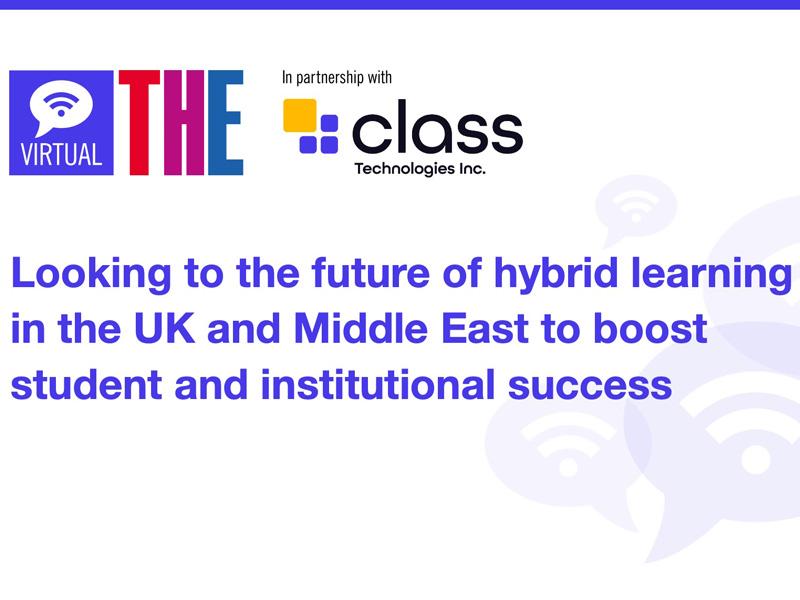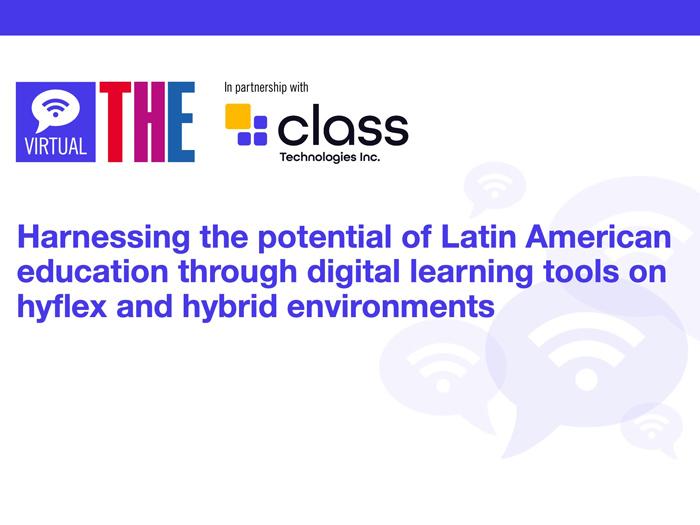Keeping students engaged is one of the biggest challenges facing hybrid and online learning, according to the participants of a recent Times Higher Education webinar, held in partnership with education technology company Class Technologies.
“Hybrid learning provides the best of both worlds from traditional as well as online learning,” said Jolly Sahni, associate director of MBA programmes at Prince Sultan University in Saudi Arabia. “It comes with flexibility, freedom of choice and other things, but has many challenges as well.”
If students are not engaged, online delivery increases the likelihood that they will stop attending classes and drop out, the participants agreed.
To succeed in a hybrid environment, “the student really has to see the worth of the course and its value”, said Gareth Neighbour, head of school at the Open University. “We have got to see the world through the student’s eyes in order to be able to design, provide and deliver products and experiences that are really worth it from a student’s perspective.”
Social inclusion is an important aspect of this value proposition, the participants said. They discussed different strategies for promoting social interaction. Lisa Taylor, associate dean for employability at the University of East Anglia, said peer group learning can keep students engaged and help them feel like part of a community.
Neighbour said his institution created extracurricular “social cafes” that allow students to interact authentically. Hatem Masri, dean of the College of Business Administration at the University of Bahrain, said he encouraged faculty to use games such Minecraft to teach students how to collaborate. He said universities should reward students for taking part in extracurricular activities.
Massimo Gentili, Class Technologies’ general manager for EMEA, said the advanced breakout rooms offered by his company’s virtual classroom technology created spaces in which students could interact while allowing teachers to monitor student activity in a way that would not be possible in a traditional classroom.
Employers increasingly expect employees to be able to interact and collaborate online, said Gentili. Such technologies “are not only in university, but also in the corporate sector”. University students are “expected to learn not only the content itself, but also the soft skills and ability to meet the basic requirements of the corporate world”.
Students want to ensure that their studies add value and make them more employable, the participants said, and the various universities had different strategies to increase student engagement and graduate employability.
The University of Bahrain invites industry professionals to interact with students via video teaching and question-and-answer sessions, said Masri. “This is someone else from outside the college, a professional who will be able to speak their language and show them the value of what they learned.”
Catherine Chambers, director of the Keele Institute for Innovation and Teaching Excellence at Keele University, also encouraged industry engagement to drive attendance and improve employability. Chambers, who teaches podcasting and radio production, invited industry professionals to give students feedback. She says the real-world learning experience and feedback from professionals in the field were “absolutely critical for student motivation and keeping them engaged throughout”.
While there may be challenges with the hybrid learning model, it also created a safe space for students and its flexibility increased accessibility and opportunities for working students or those from lower-income backgrounds. For example, through placement opportunities and online internships, “the online world has given students a breadth of exposure that otherwise wouldn’t have been possible through the real, in-person world”, said Taylor.
Maher Omar, director of the Institute of Leadership in Higher Education at the University of Sharjah, said it was also important to focus on competencies and ensure that values such as cultural diversity, justice and fairness were also included in hybrid teaching models.
The panel:
- Catherine Chambers, director, Keele Institute for Innovation and Teaching Excellence, Keele University
- Massimo Gentili, general manager (EMEA), Class Technologies
- Julia Gilmore, branded content manager (EMEA and the Americas), Times Higher Education (chair)
- Hatem Masri, dean, College of Business Administration, University of Bahrain
- Gareth Neighbour, head of school, the Open University
- Maher Omar, director, Institute of Leadership in Higher Education, University of Sharjah
- Jolly Sahni, associate director of MBA programmes and director of the Jubilation Office, Prince Sultan University
- Lisa Taylor, professor of employability and learning innovation and associate dean for employability, University of East Anglia
Find out more about Class Technologies.


comment